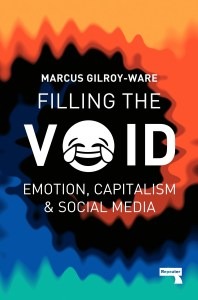
Platforms such as Facebook and Instagram have come to be an integral part of the lives of billions of people across the world. But are they simply another source of information and entertainment, or an ominous symptom of capitalism’s excesses? In his new book, "Filling the Void: Emotion, Capitalism, and Social Media", Marcus Gilroy-Ware, a senior lecturer in digital journalism at the University of the West of England, examines this question. The book explores the real reasons we use social media, and what this means for our understanding of culture, politics and capitalism. Here, he discusses some of his arguments.
What brought you to this subject matter?
I got really interested in why people use social media and what they are looking for after getting a job teaching journalists about the spread of information on the internet in 2008. At that time, there was this - I believe, mistaken - view that internet use was largely rational and information-centric. Make great journalism, and the people will come, and the “right to know” that is so enshrined in journalism and in democracy, will be reinforced by technology. I just didn’t buy that for a second, and I think the last few years, from “fake news” to Buzzfeed “listicles” to Facebook’s two-billion-user threshold have vindicated that doubt.
Obsessive smartphone use is endemic. Is this a problem?
I don’t think smartphone use is intrinsically a problem, and I’d be an enormous hypocrite if I had ever said or thought that. Where it gets interesting is that widespread smartphone-based access to social media reveals features of the societies where it takes place, just as any widespread behaviour does. Smartphones are one of the most convenient means of access to a variety of communications and media, but they are really just a proxy for those media. I think it is our consumption of those media, rather than the means of access, that is worth examining. You used the word “obsessive,” and I think that’s almost right, although obsession is far more driven by a conscious, specific aim, like reading a gripping novel, or if you think of a jealous lover. The way I would describe it is more as “compulsive” - i.e. we can’t help but do it, even if we don’t know why. Well, I think we need to be asking why. Studies show people now check their smartphones while they drive and while they have sex! These extremes are part of a much broader pattern of compulsive media consumption that we need to understand. I think when we examine the use of social media in these ways, including on smartphones, we can learn something about the particular chapter of late capitalism that we’re in, and the ways that it both creates and exploits a desire for consumption, and also produces a reality from which people are trying to distract themselves.
What are we compensating for when we use social media, and is it related to our current political and economic context?
The simple answer is that “the current political/economic context” as you call it, is what we are compensating for. Some readers will be familiar with the work of Mark Fisher, who sought to analyse the variety of postmodern late capitalism we live under, which presents itself as without alternative, and connect it to the epidemic of depression and other mental health crises that we are seeing. Examples of different aspects of that “capitalist realism,” as he called it, might be the increasingly precarious conditions under which many of us work, the incorporation of economic logic into ever more domains of life, such as romance or creativity, and the sense that nothing we do will make any real difference or create a brighter, clearer future. More specifically, one of the things that really inspired me to write the book was Fisher’s idea of “depressive hedonia.” While normally depression involves anhedonia – the inability to feel pleasure – the depressive states brought about by capitalist realism can result in, as Fisher argues, “an inability to do anything else except pursue pleasure,” particularly in the young, who have known nothing except this capitalist realism. The social media timeline involves a stream of media that are novel, varied, abundant, and originate from familiar, trusted sources. This is an extremely appealing combination, and looking at the ways people used timeline media, it struck me that things like Facebook, Instagram and Twitter were excellent examples of depressive hedonia in a digital form, often with the smartphone as a gateway. The fact that as you use them and incorporate them into your life ever more, your desire for digital depressive hedonia is also exploited for commercially valuable data only makes the picture more sinister, and that’s before you look at things like so-called “fake news,” which is also discussed in my book’s final chapter.
How do social media impact our performance of identity?
What I would say first of all is that we should be careful with the simplification that social media themselves ‘impact’ things. The agent of change is usually people. Like all technologies, social media enable things that were desired but not possible before, and this reveals aspects of our societies (and identities) that might have otherwise been harder to identify. New technology is like a gate being opened, but we should always ask who is opening the gate, why they are opening it, and what they get from it. You could ask the same of any other technology, from the toaster to the machine gun to the electric car.
As for identity, the traditional way of looking at this question, which is covered comprehensively in the work of danah boyd, the early work of Sherry Turkle, and many others, is to look at how people have used social media to construct identities that they could not easily inhabit away from the internet. As a result, a lot of people apply the work of early sociologist Erving Goffman – who considered identity primarily as a performance – to social media. A purely digital manifestation of identity, such as a social media profile, allows a person to polish, refine, or even feel that they are correcting aspects of how they perform who they are.
Where I think we need to be paying the most attention at the moment are the ways in which politicised identity – class, race, gender, sexuality, and so forth, and especially the intersections of those aspects of our identities – comes into contact with our online sociality. There is currently a lot of pressure and tension around political identity, and the internet tends to be where we express a lot of this strong feeling. The disinhibition we show when using digital platforms certainly amplifies the tensions inherent in politicised identity in ways that are, in my view, counter-productive at best. And that’s not just true on the far-right, whose social media use I have been researching for a while, it’s true in mainstream Twitter call-out culture as well.
It breaks my heart to see important questions of justice and inequality distilled into a sort of highly concentrated, toxic form because people forget they’re talking to another human being. I’ve stopped even trying to have any actual political discussions that are digitally mediated, even with people who I consider allies. I’ve grown up around people who have given their lives to fighting injustice, and that necessity for support and solidarity between all human beings goes to the very core of who I am. But online, people who don’t know you seem to be much quicker to decide that your gender, race, sexual orientation, etc., disqualifies the validity of what you can contribute, than to recognise any gesture of solidarity across those aspects of our identities. I guess it’s a reminder that technology isn’t the answer to everything, lest we needed reminding of that.
Can any meaningful distinction be drawn between online and real life?
Not anymore. The idea of this distinction has always been a popular one, and especially in the earliest years of the web when the ability to communicate with strangers and make new friends in far away places was new, people often conceived of the web as a “separate space” that was distinct from real life. I don’t think it ever was separable, but it’s understandable how people thought of it that way. The metaphor of the internet or the web as separate space has less and less application as the technologies of the internet are incorporated ever more intimately into our daily lives. Today, on a web where your friends online are the same friends as you have in the rest of your life, the things you “like” on Facebook correspond to non-digital things you actually like, and you can be arrested, fired, or even lose your life because of the things that are happening in our use of digital media, I don’t think it’s either accurate or useful to try and draw this distinction. The same culture, economic and social relations and balance of power are to be found online as elsewhere in our lives, and the rest is largely wishful thinking.
We have heard a lot recently about "filter bubbles" and social media affecting the way we consume news. Is this a concern?
Yes and no. What concerns me is polarisation, but I think that is a social problem that has always existed to some degree. What’s that clip from Yes, Prime Minister about all the different newspapers and who reads them? “The Guardian is read by people who think they ought to run the country; The Times is read by the people who actually do run the country.” At present it feels particularly acute, and our use of all media, social and also things like TV and newspapers (for those few that still buy them), reveal how polarised we have become. The “Blue Feed Red Feed” experiment built by the Wall Street Journal illustrates this in a US context with horrifying effect. I do think there is a concern about how timeline media such as Facebook and Twitter can amplify people’s existing prejudices or inaccurate beliefs, but I am more sceptical about the idea that what we read online actually drastically changes people’s opinions, say from remain to leave, or Hillary to Trump. There’s very little evidence that social media actually cause this kind of primary opinion formation, as opposed to stoking the flames of ignorance and polarisation that already exist.
What are the political consequences of the pattern you analyse?
I think once you accept that on social media, most people are looking for emotional stimulation of some kind – whether laughs, love, anger, hate, or something else – rather than rational pursuits such as information and reasoned debate, you really see the vulnerabilities that social media platforms exploit in their users. This is the people versus capital, but without most people even realising it, so we have to be on the users’ side every time. For me this unwitting standoff has a number of facets that I will summarise here but explore in the book in more depth.
For one, I think the whole “fake news” phenomenon is only possible because if it’s emotion people are after, the importance of “truth” becomes rather secondary, especially when it turns out to be discordant with their own convictions. People aren’t going online to be told that they’re wrong, and that makes complete sense once you accept the fact that their primary engagement with it is emotional rather than factual.
Secondly, I think that there are issues over how we are alienated from our own content – the materials we upload to Facebook, Instagram and so forth. Of course, given growing social isolation we’re desperate to share moments from our lives, but at the same time uploading a photo of your baby to Facebook is effectively the same as emailing it to an advertising agency of Mark Zuckerberg’s choosing and saying “here, use this for whatever you want, for as long as you like” and CC’ing a few of your friends. How many parents would do that?
Finally I think there’s also a way in which our (completely understandable) compulsion both to consume the endless stream of novel media in the timeline and interact with each other on social networks means we are distracted from the surveillance, experimentation and data harvesting that is being systematically conducted by Facebook, Google, Twitter and so forth. Shoshana Zuboff and Aral Balkan have both been excellent at pointing out these patterns, and they’re also explored in depth in my book.
Are current trends reversible? Will we always be this dependent on our smartphones and social media?
As I say, the issue is not the smartphones or social media, but the things they tell us about the society we have created. I will be happy when people aren’t interested in social media anymore because our cultural and economic conditions don’t depress us and undermine our mental health to the same degree. The question is really about how we get to that point, but as long as there is “depressive hedonia” and there are people in Silicon Valley trying to make money out of its digital manifestations, we will be staring at various forms of screens in our search for distraction. As for smartphones and hardware, people are already beginning to say that the days of the smartphone are limited. Devices such as Google Glass, Apple Watch, or even the Oculus Rift – a virtual reality platform owned by Facebook – show us that the direction things are moving in is away from anything that resembles a telephone.
Where do you see things going next?
Personally I’m moving away from writing about technology, and in a way my book was always more about the political culture that makes social media possible and likely, rather than about social media themselves. At the moment, we’re facing two huge global challenges – one is a return to fascism and political violence, all the way from Myanmar to Palestine to Charlottesville, and the other is the danger to our natural environment. Whether it’s Daesh’s reliance on the oil trade, the UK’s arms trade and its lethal consequences in places like Yemen, the US far-right’s nostalgia for the days of the slave trade, or the dark money funding climate change denial, you can trace the influence of markets and capital in most aspects of our alarming political reality. I think rather than fighting with each other to rearrange the deckchairs of the Titanic, as it were, we need to start on a new tack that exposes the insidious role of money and capitalism in these crises and starts to build an awareness of what is really going on. From my perspective, teaching in a journalism department, how people find out about these issues and connect the dots is really the most important issue in turning the situation around.

